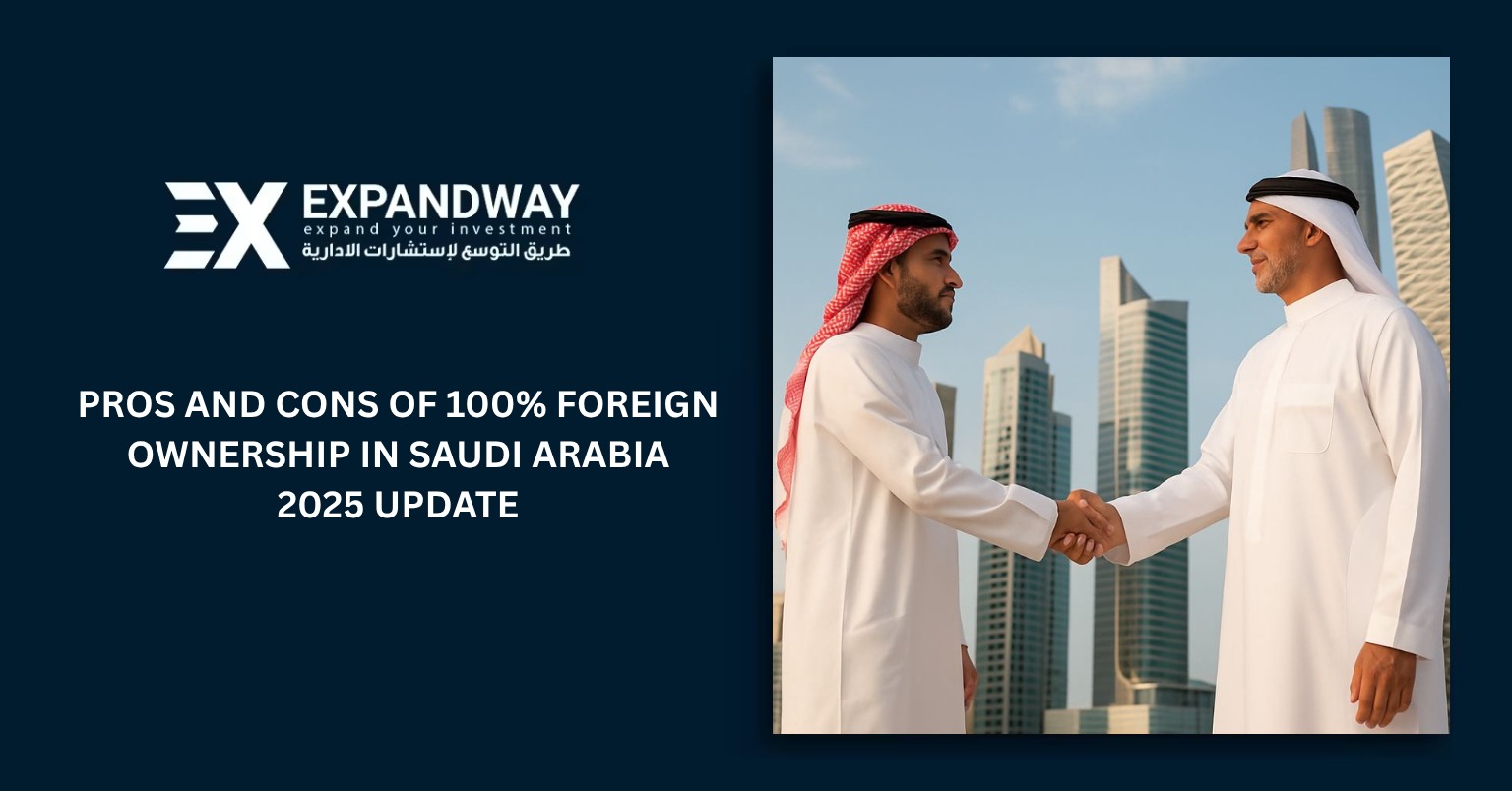Introduction
Saudi Arabia is undergoing a rapid transformation. Thanks to Vision 2030, the Kingdom now welcomes 100% foreign ownership, making it easier than ever for global investors to operate in the region. But while the opportunities are immense, investors must understand both the advantages and challenges before entering the Saudi market.
What is 100% Foreign Ownership in Saudi Arabia?
100% foreign ownership allows non-Saudi investors to fully own and operate their businesses in the Kingdom, without the need for a local partner. Recent regulatory reforms and a new Investment Law have simplified company registration, reduced paperwork, and enabled streamlined operations for international investors
Key Advantages of 100% Foreign Ownership
1. Full Operational Control
Foreign investors enjoy complete decision-making power, no longer tied to local joint-venture partners. This grants full authority to set up, scale, and manage business operations, unlocking all possible business opportunities.
2. Streamlined Business Operations
The new Investment Law removes the traditional foreign investment license requirement. Now, investors face a one-time, simplified registration process, slashing bureaucratic hurdles and enabling faster market entry.
3. Attractive Financial Incentives
Saudi Arabia offers a host of tax breaks and financial incentives, such as:
- Tax exemptions for up to 20 years in key Vision 2030 sectors
- Zero percent corporate tax and withholding tax for 30 years for companies establishing regional headquarters
- No personal income tax for foreign investors
- Subsidies and support for industrial land acquisition
Special Economic Zones (SEZs)
- 5% corporate income tax for 20 years
- 0% withholding tax on repatriated profits
- 0% VAT for intra-SEZ goods
- Duty-free import of machinery/raw materials
- Flexible talent regulations for the first five years
4. Access to High-Growth Markets
With its unique geographic position, Saudi Arabia serves as a trade and logistics hub bridging Europe, Asia, and Africa. Vision 2030 prioritizes growth in tourism, technology, manufacturing, healthcare, and renewables.
5. Legal Protection & Equal Treatment
Foreign investors now enjoy equal treatment as locals, the right to repatriate funds, and the ability to appeal penalties. Full property ownership is possible for licensed activities, and foreign-owned companies receive the same privileges as Saudi-owned ones.
Challenges & Limitations of 100% Foreign Ownership
1. Sector-Specific Restrictions
Despite liberalization, some sectors remain off-limits to foreign investors (the “Negative List”):
- Oil exploration and production
- Military and defense manufacturing
- Security services
- Real estate in Makkah and Madinah (with some recent reforms)
- Telecommunications, commercial agencies, and distributorships
2. Cultural & Business Environment
Business success in Saudi Arabia requires deep understanding of:
- Islamic law (Sharia) and its impact on business practices
- Social norms, gender roles, and religious customs
- Trust-based business relationships and the concept of “wasta” (personal connections)
- Non-verbal communication styles
3. Regulatory & Administrative Complexities
Navigating Saudi Arabia’s evolving legal landscape can be challenging, with sector-specific rules and frequent regulatory changes. Paperwork, licensing, and compliance requirements may still be complex for newcomers.
4. Market Competition & Economic Risks
Saudi Arabia’s market is increasingly competitive, with established local players and other international investors. Economic performance is still influenced by global oil prices, leading to potential volatility.
5. Infrastructure & Talent Issues
Finding skilled labor can be difficult in certain sectors. Foreign companies must comply with Saudization (hiring local talent) and sponsor visas for non-Saudis. Securing financing may require local guarantors or collateral.
Saudi Arabia’s Foreign Investment Performance: 2024 Snapshot
- FDI inflows have quadrupled in the last seven years.
- In 2024, Saudi Arabia attracted $26 billion in FDI, exceeding government targets.
- The number of foreign licenses granted increased 10x in recent years.
- Foreign ownership in the capital market surged by 300% (2018-2022), reaching SAR 347.01 billion.
- Over 200 companies established regional headquarters in the Kingdom.
Strategic Considerations for Foreign Investors
Success in Saudi Arabia requires careful planning:
- Invest in cross-cultural training and local advisors.
- Understand your sector’s specific regulations and compliance needs.
- Align your business strategy with Vision 2030 priorities.
- Prepare for the unique cultural and legal business environment.
With proper groundwork and expert support, 100% foreign ownership in Saudi Arabia offers tremendous opportunities for growth, expansion, and long-term profitability.
Conclusion
Saudi Arabia’s new policies make the Kingdom a highly attractive destination for foreign investors. The advantages—total ownership, streamlined processes, and robust incentives—are clear. However, challenges remain, especially in navigating local regulations, culture, and sector restrictions. Thorough research, local expertise, and a strategic approach are essential for any business looking to thrive in Saudi Arabia’s rapidly evolving market.

